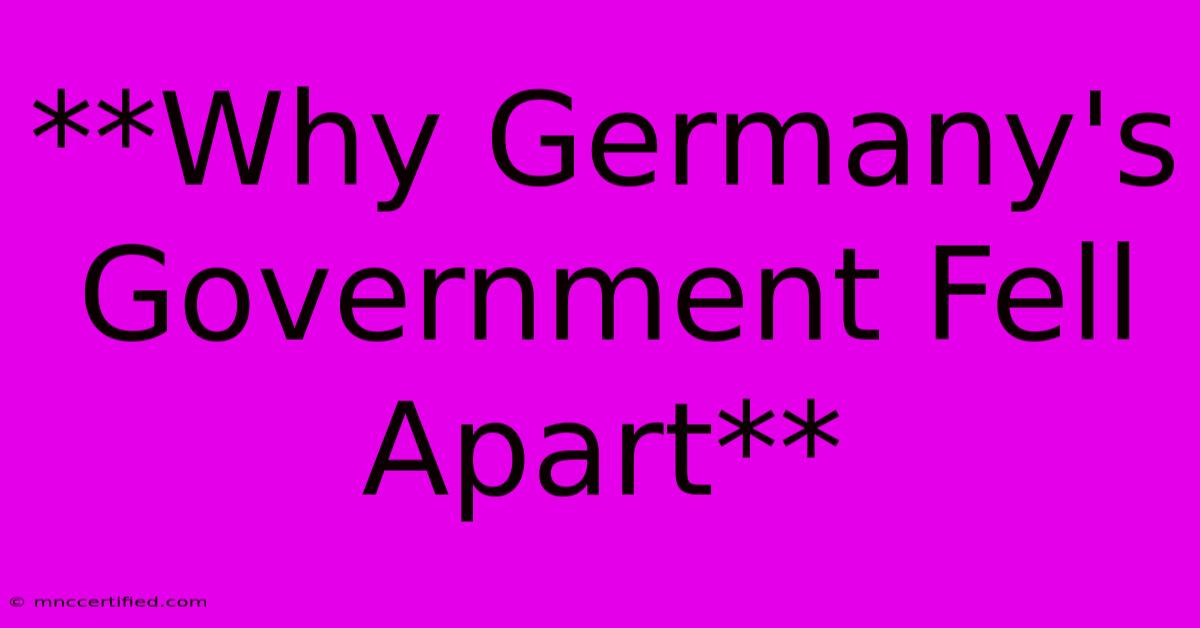**Why Germany's Government Fell Apart**

Table of Contents
Why Germany's Government Fell Apart: A Look at the Collapse of the Scholz Coalition
In August 2023, the German government, led by Chancellor Olaf Scholz, collapsed after a mere 18 months in power. This unexpected event sent shockwaves through the political landscape, leaving many wondering what went wrong. While various factors contributed to this dramatic downfall, understanding the key triggers is essential to grasp the implications for Germany's future.
The Seeds of Discord: Key Contributing Factors
1. Internal Strife: The coalition government, comprised of the Social Democratic Party (SPD), the Green Party, and the Free Democratic Party (FDP), was built on a delicate balance of ideologies. This inherent tension became apparent during the first months of the coalition's tenure, with disagreements surfacing on key issues like energy policy, climate change, and defense spending.
2. The Housing Crisis: Germany's burgeoning housing crisis, characterized by soaring rent prices and a shortage of affordable homes, became a major point of contention. The coalition failed to agree on concrete measures to address the issue, leading to growing public frustration.
3. The War in Ukraine: The war in Ukraine further exacerbated existing tensions within the coalition. The Greens, committed to pacifism, struggled to reconcile their stance with the government's decision to send weapons to Ukraine. This internal debate over the war's ramifications further strained the fragile alliance.
4. The FDP's Departure: The final straw came with the unexpected withdrawal of the FDP from the coalition. The party, known for its fiscally conservative policies, felt increasingly marginalized within the government. Their departure, fueled by disagreements over the direction of fiscal policy, ultimately led to the collapse of the entire coalition.
The Fallout and its Impact
The collapse of the German government has profound implications for the country's political landscape.
1. Political Uncertainty: The sudden power vacuum leaves Germany in a state of political uncertainty. With no clear path forward, the country faces the prospect of new elections, which could further destabilize the government and delay crucial policy decisions.
2. Economic Concerns: The ongoing economic challenges, including inflation and the energy crisis, become even more complex in the absence of a stable government. The lack of clear leadership and policy direction could further undermine investor confidence and economic stability.
3. International Repercussions: Germany's role as a leading force in Europe and globally is weakened by the political turmoil. The collapse of the government could hinder the country's ability to effectively address international challenges, including climate change and security threats.
Looking Ahead: Navigating the Uncertain Future
The fall of the Scholz coalition serves as a stark reminder of the complexities of coalition governments. The events highlight the importance of compromise, clear communication, and a shared vision for effectively addressing the challenges facing a nation. While the future remains uncertain, Germany's political landscape will likely be shaped by the lessons learned from this tumultuous period.
The upcoming months will be crucial for Germany as it navigates the path towards a new government. The ability to overcome the current political deadlock and find consensus on key issues will determine the country's trajectory and its capacity to navigate the complex challenges of the 21st century.

Thank you for visiting our website wich cover about **Why Germany's Government Fell Apart**. We hope the information provided has been useful to you. Feel free to contact us if you have any questions or need further assistance. See you next time and dont miss to bookmark.
Featured Posts
-
Us Fed Rate Cut Powell Resignation Unlikely
Nov 08, 2024
-
Trump Election How It Affects Fed Cuts
Nov 08, 2024
-
Redpoint County Mutual Insurance Payment
Nov 08, 2024
-
The Day Of The Jackal 2024 A Stylish Review
Nov 08, 2024
-
Job Description Of Insurance Coordinator
Nov 08, 2024